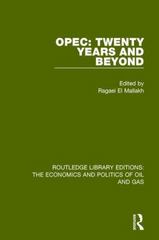Question
Consider a monopolist selling a product with inverse demand of PD=12Q. The firm currently has production costs of C(q)=5+6Q. The firm has the option of
Consider a monopolist selling a product with inverse demand of PD=12Q. The firm currently has production costs of C(q)=5+6Q. The firm has the option of attempting to develop a new technology that would lower production costs to C(q)=5+2Q. Research and development costs are $4 if undertaken and must be incurred regardless of whether or not the new technology is "successful" or a "failure." This means that in case of failure, the firm still needs to produce with C(q)=5+6Q but incurs $4 in sunk costs. If the firm attempts to develop the new technology, the innovation will be successful with probability p=3/8. Throughout your analysis, restrict attention to the profit/loss of the firm in only the current period (i.e., assume that the firm will not be operating in any future period).
Question 42(1 point)
Assume that the monopolist is risk neutral, which statement is true?
Question 42 options:
The monopolist chooses to develop the new technology.
The monopolist chooses not to develop the new technology.
The monopolist is indifferent between developing or not developing the new technology.
From the given information, it is not possible to say whether the monopolist chooses to develop or not to develop the new technology.
Question 43(1 point)
Assume that the monopolist is risk averse with utility function U=sqrt(Payoff), what is the expected utility from developing the new technology, EU(NT)=
Question 43 options:
1.5
2.0
4.0
6.0
Question 44(1 point)
Assume that the monopolist is risk averse, which statement would be true?
Question 44 options:
The monopolist chooses to develop the new technology.
The monopolist chooses not to develop the new technology.
The monopolist is indifferent between developing or not developing the new technology.
From the given information, it is not possible to say whether the monopolist chooses to develop or not to develop the new technology.
Question 45(1 point)
Assume that the monopolist is risk averse, what would be the expected utility of perfect information [assuming that U(Payoff)=sqrt(Payoff)]?
Question 45 options:
2.75
3.0
3.25
3.5
Question 46(1 point)
Assume that the monopolist is risk averse, what would be the maximum willingness to pay for perfect information?
Question 46 options:
3.0
3.25
3.56
4.0
Question 47(1 point)
Assume the monopolist could consult an engineer who, while not being able to provide perfect information, can evaluate the new technology as either "Promising" or "Risky." You then update your preferences. If P(Success)P(Promising|Success) = 0.3, what is then the updated probability of P(Risky | Success)?
Question 47 options:
1/10
2/10
3/10
4/10
Question 48(1 point)
Assume the monopolist could consult an engineer who, while not being able to provide perfect information, can evaluate the new technology as either "Promising" or "Risky." You then update your preferences. If P(Failure)P(Risky|Failure) = 0.5, what is then the updated probability of P(Promising| Failure)?
Question 48 options:
1/10
2/10
3/10
4/10
Question 49(1 point)
After updating preferences, what is the monopolist's probability of obtaining a promising result, P(Promising) =
Question 49 options:
17/40
18/40
19/40
20/40
Question 50(1 point)
After updating probabilities, what is the monopolist's probability of obtaining a risky result, P(Risky) =
Question 50 options:
21/40
22/40
23/40
24/40
Question 51(1 point)
Assume the monopolist is told by the engineer that the technology is "promising," what's the monopolist's expected payoff from pursuing the new technology?
Question 51 options:
11.29
12.19
21.91
29.11
Question 52(1 point)
Assume the monopolist is told by the engineer that the technology is "risky," what's the monopolist's expected payoff when pursuing the new technology?
Question 52 options:
0.29
0.92
2.09
20.9
Question 53(1 point)
After updating probabilities, what is the monopolist's expected payoff from the engineer's information?
Question 53 options:
5.3
6.2
7.1
8.0
Question 54(1 point)
Assuming risk-neutrality, what is the monopolist's maximum willingness to pay for the engineer's evaluation?
Question 54 options:
1.3
2.2
3.1
4.0
Question 55(1 point)
Assuming risk-aversion [U=sqrt(Payoff)], what is the monopolist's maximum willingness to pay for the engineer's evaluation?
Question 55 options:
0.65
1.65
2.65
3
Step by Step Solution
There are 3 Steps involved in it
Step: 1

Get Instant Access to Expert-Tailored Solutions
See step-by-step solutions with expert insights and AI powered tools for academic success
Step: 2

Step: 3

Ace Your Homework with AI
Get the answers you need in no time with our AI-driven, step-by-step assistance
Get Started


